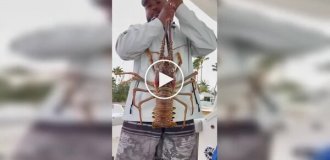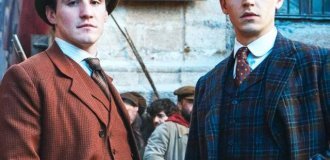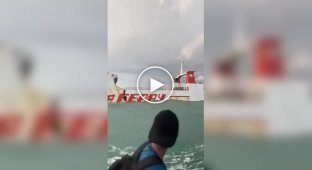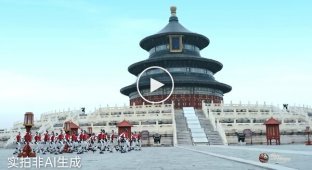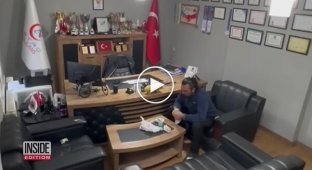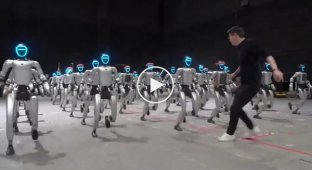Yuri Dvuzhilny and Vera Voloshina: they were separated by the war
The war distorted many destinies. I want to talk about two people she separated forever. About people who heroically fought and died for their Motherland.
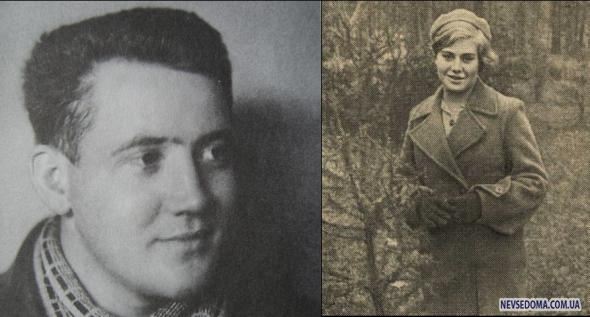
On June 22, on the way to the Trinity Lavra of St. Sergius Museum, Vera Voloshina and her friends ran into a department store. An amazing white silk dress caught the girls' eyes. We decided to buy it immediately! And the occasion was wonderful: Verochka was proposed to by her fiancé, Yuri Dvuzhilny. But it was decided to take place the wedding next year. After finishing studies. The plans collapsed overnight.
...No trial. The girlfriends didn’t have a chance to shout “Bitter!” at the wedding of a couple in love, it was not destined to rejoice at their first child... War. There is such a terrible word that resonates with pain in every heart. Romeo and Juliet of the forties went to the front without being kissed. They left, never to meet again. To enter immortality through your exploits...
Part one.
Yuri Dvuzhilny is my fellow countryman. Born on August 25, 1919 in the village of Konstantinovka, now a city in the Donetsk region of Ukraine, in the family of an employee. He graduated from high school No. 12 in the city of Kemerovo (where they met Voloshina). He studied at the Civil Air Fleet Institute in Leningrad.
In the Red Army since 1940. Participated in the Soviet-Finnish war of 1939-1940. On the Karelian Isthmus he received a baptism of fire. In difficult winter conditions, he took part in many battles, showed courage and bravery, for which he was awarded the Order of the Red Banner. In March 1942, Dvuzhilny graduated from the Leningrad Air Force Academy, and in November 1942 he graduated from the Shot course. With the rank of captain, he was sent to one of the reserve aviation regiments.
In the active army since February 1943. At the front, Dvuzhilny ended up in the infantry, or rather in a penal company. On an unsupported charge of damaging aircraft equipment, he was demoted to private and sent to a penal company of the 49th Army. In the fall of 1943, he participated in the liberation of the Kaluga and Smolensk regions, the cities of Spas-Demensk and Roslavl. He was wounded in the battles. As having atoned for his “crime” with blood, in January 1944 the “penalty” was lifted from Dvuzhilny, he was restored to the rank of captain and appointed commander of the 3rd Infantry Battalion of the 290th Infantry Division.
Captain Dvuzhilny distinguished himself during the liberation of the Mogilev region. On June 23 and 24, 1944, the Dvuzhilny battalion north of the city of Chausy crossed the Pronya and Basya rivers, took enemy positions with battles, and liberated the villages of Suslovka and Popovka. On June 25, 1944, Captain Dvuzhilny’s battalion reached the Resta River (20 km from Mogilev). Fierce fighting broke out. The villages of the Mogilev region - Khoroshki, Sukhari and others - changed hands several times. It often came to hand-to-hand combat. Here the Dvuzhilny battalion repelled six enemy counterattacks.

Former regiment commander Mikhail Grigorievich Khomulo writes in his memoirs about Yuri Dvuzhilny:
“In May 1944, Captain Dvuzhilny Yuri Mikhailovich arrived to the post of commander of the 3rd battalion. He was a tall, slender young man (he was then, it seems, no more than 23-24 years old), serious beyond his years, strong-willed, and well-developed physically. I remember that he was very interested in the tactics of combined arms combat, often asked questions to me and my deputies, questioned his comrades. His concern for the fate of the battalion entrusted to him was felt, he wanted to know everything before the start of the offensive.
At this time, the regiment was undergoing intensive training in learning how to cross rivers, we trained the unit to advance after an artillery barrage, fight in populated areas, storm bunkers, advance into the forest, etc. These were days of intense training before the offensive.
In his free moments, Yuri thought a lot, calculated in his mind, weighed, calculated. I remember, when making the decision to attack, I asked all three battalion commanders, including Yuri, who wanted to attack in the first echelon. Without hesitation, he was the first to say: “I ask you to put the 3rd battalion in the first echelon of the regiment.” My choice was also the 3rd battalion, because during the preparation for the offensive I saw what each battalion commander was capable of and how his battalion was prepared. Moreover, I expected that Yuri himself would ask to put his battalion in the first echelon.
Two days before the start of the offensive, the battalions were assigned a combat mission. After crossing the river, the 3rd battalion was supposed to take possession of the grove, which served the Germans as a fortified defense center. Mastery of this grove decided the success of the business.
I explained in detail to Captain Dvuzhilny the importance of taking this strong point for the offensive of the regiment and our entire division, all the responsibility that falls on the 3rd battalion, and, of course, I spoke about all the difficulties and dangers that would have to be faced.
Captain Dvuzhilny spent two days studying the enemy’s defenses, the approaches to the river, the fire system, and determined from where it would be best to attack the grove, which was located a kilometer from the front line.
On the day of the offensive, a post was planned
and a two-hour artillery preparation. At the twenty-fifth minute of artillery preparation, Captain Dvuzhilny launched his battalion on the offensive. The artillery created a “corridor” for his people, that is, along the path of the battalion’s movement, it transferred fire further, covering it from the flanks. As a result of this, the 3rd battalion crossed the river, took the grove by storm and, by the end of the artillery barrage, began a battle for the village of Suslovka (two and a half kilometers from the front line). The battalion's breakthrough was so rapid that the Germans literally were unable to do anything to oppose it. The battalion captured a large number of prisoners, guns, tanks, and mortars. The commander of the German battalion, a major, and many other officers were captured.
In all this there was great risk, great courage of the commander, but also sound calculation.
In the first 25 minutes of artillery preparation, our artillery suppressed the defense of the front line and transferred fire to the enemy’s second trench. But already at this time, walking closely behind the barrage of fire, our soldiers burst into the first trench and quickly moved towards the second. The artillerymen, meanwhile, transferred their fire to the third trench, etc. The Germans thought that during the artillery preparation the Russians would not attack, and sat in their “holes” until Dvuzhilny’s battalion fell on them. All this had a stunning effect on the Germans.
The daring actions of the 3rd battalion ensured success for the main forces of the regiment and division; we successfully crossed the Pronya River and the next day, on the shoulders of the Germans, broke into the right bank of the Basya River...
And on June 25, our troops began fighting for the village of Khoroshy, which changed hands several times. Here Captain Dvuzhilny was killed by a shell fragment..."
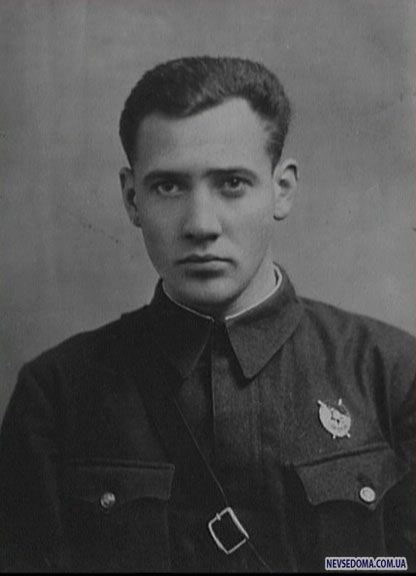
This is what Stepan Petrovich Strumentov, one of his comrades in arms, wrote about how Yuri Dvuzhilny died:
“After we crossed Pronya and repelled enemy counterattacks near the village of Suslovka, the regiment, pursuing the enemy, broke into the right bank of the Basya River with a rapid march and went to Khoroshki. The village was occupied after a short battle, but there was another river ahead - Resta. A narrow river, and it flowed closer to the enemy's defenses. And our bank was low, gentle. The Nazis even cut down the bushes to clear their firing zone.
We wanted to immediately cross Resta and capture the village of Sukhari, which was on the other side and served as a stronghold for the Germans. But our attack was repulsed, followed by a second, a third. And then the Germans themselves launched a counterattack with the support of eight Ferdinands. They lay down in the craters and began to fight back. We have repulsed several counterattacks and are preparing to go on the offensive again. At this time, the battalion commander’s liaison crawls up to me, hands me a field bag and says that the commander has just been killed by a shell fragment.
We went on the attack and crushed the enemy..."

Last photo of Yuri, April 1944
And here is an excerpt from a letter from Grigory Makarovich Aksanov, battery commander of the 355th separate anti-tank fighter artillery division:
“The battery that I commanded was attached to the battalion of Captain Dvuzhilny. Our meeting took place already on the bridgehead in a German trench captured by our soldiers. I remember that he was a young officer, a little older than me (I was then 21 years old). But in everything he His appearance conveyed firmness, confidence and cold-blooded calculation, the ability to briefly and clearly set a combat mission for us, the artillerymen. I remember him as an intelligent officer, already wise in combat experience by that time.
Carrying out the task of the regimental and division command, the battalion firmly held a bridgehead on the right bank of the Basya River. The enemy's attempt to shoot down the advance detachment was unsuccessful. Having lost a large number of dead and equipment, the Nazis were unable to overthrow a handful of soldiers who were on a bridgehead measuring only one and a half kilometers along the front and up to one kilometer in depth.
And then there were battles for the village of Khoroshki, crossing the Resta River. In order to reach the Ryasna-Mogilev highway and capture the village of Sukhari, our soldiers had to fight for literally every meter of their native Belarusian land. This is where Captain Dvuzhilny died.
His death was announced on the same day to the entire division's personnel, and his feat was set as an example to all soldiers, sergeants and officers. We knew even then that he was nominated for the title of the highest military valor - Hero of the Soviet Union. The courageous feat of the fighters of the 3rd battalion and its commander, Captain Dvuzhilny, was for all of us an example of fulfilling our military duty and largely contributed to the success of our troops in crossing the Dnieper and liberating Mogilev..."

The place where Yuri Dvuzhilny died.
The brave battalion commander died a heroic death along with thirty-six soldiers of the 3rd battalion on June 26, 1944. He was buried in a mass grave in the village of Khoroshki, Mogilev region.
Text of the Decree of the Presidium of the Supreme Soviet of the USSR:
"For exemplary performance of command tasks on the front of the fight against the German invaders
ami and the courage and heroism shown at the same time to award the title of Hero of the Soviet Union with the presentation of the Order of Lenin and the Gold Star medal to Captain Dvuzhilny Yuri Mikhailovich.
Chairman of the Presidium of the Supreme Soviet of the USSR
M. KALININ
Secretary of the Presidium of the Supreme Soviet of the USSR.
A. GORKIN.
Moscow, Kremlin, March 24, 1945."

An obelisk was erected on the site of the mass grave.
Named after the Hero:
street in the city of Kemerovo
School No. 2 of Donetsk
Sukharevskaya school, Mogilev district.
By order of the USSR Minister of Defense Yu.M. Two-core is forever included in the lists of the Military Engineering Institute named after A.F. Mozhaisky (now the A.F. Mozhaisky Military Space Academy).
The name of the Hero is borne by the ship of the Azov Shipping Company.
Part two.
Vera Voloshina was born on September 30, 1919 in the city of Kemerovo, in the family of a miner and a teacher. From the first grades of school I was involved in sports: gymnastics and athletics. In high school, she won the city high jump championship. Her classmate and close friend was Yuri Dvuzhilny. Having moved to Moscow after finishing ten classes, she entered the Moscow Institute of Physical Culture and Sports. In parallel with the institute, she enrolled in the Moscow flying club, where she mastered piloting the I-153 “Chaika” aircraft and took up parachute jumping. In addition, she became seriously interested in shooting, drawing and poetry. In 1936 she wrote a statement about her desire to take part in the Spanish Civil War. She was denied.
In her first year, Voloshina, along with other students, went to a winter sports camp near Serpukhov. There the girl caught a serious cold, the flu caused serious complications on her legs. She underwent treatment for a long time, but in the end, she was still forced to quit studying at the sports institute. However, Vera found the strength to start all over again: she returned to Moscow, and together with friends from her hometown she entered the Moscow Institute of Soviet Cooperative Trade.

When the war began, Vera was a fourth-year student and took part in the construction of defensive structures around Moscow, Smolensk and Vyazma. She wrote about this to her mother Claudia Lukyanovna and relatives who lived in Kemerovo:
"Expensive!
You've probably been very worried about me lately. I went on a special assignment, like all Komsomol members in Moscow. We built fortifications.
Now, when you walk around Moscow and see the slogan: “What have you done for the front?”, you feel satisfied that you have done something...
18.VIII. '41"
Autumn 1941. 80 selected enemy divisions are concentrated to attack Moscow. Fascist planes fly train after train every day to bomb our capital. It seemed to the Nazis that it was enough to strike one more blow and they would win the war...
These days, a commission was working in the Central Committee of the Lenin Komsomol to select volunteers. The wide corridors were crowded with boys and girls. Among them was Vera Voloshina, who was looking forward to the challenge. Finally it was her turn. Secretary of the Komsomol Central Committee A. N. Shelepin and members of the commission listen attentively to the biography. The girl says: she was born in 1919 in Kemerovo, in 1935 she was accepted into the Komsomol, after graduating from school she came to Moscow and entered the Institute of Physical Culture to study, but she got sick and transferred to the Cooperative Institute. In the spring I passed the exams for the 3rd year. In recent years she has studied military science, knows a rifle, a heavy machine gun, a revolver well, knows how to drive a motorcycle, and studied at the flying club.

Behind Vera - Yuri Dvuzhilny
The short blond girl made a good impression. The commission sent her to intelligence. Vera ended up in the unit of Major A.K. Sprogis. Short days of combat training and the first baptism of fire. On October 21, 1941, Vera Voloshina, as part of a group of volunteer scouts, crossed the front line. They laid mines on the Staritsa-Kalinin highway. Soon several cars with Nazis were blown up on them.
Fascist convoys and trains with fuel took off. And more than one Fritz fell under the shots of the scouts. Vera more than once showed her comrades an example of courage and endurance.
“Voloshina Vera, being in the ranks of active intelligence at the headquarters of the Western Front,” her former boss later wrote, “the old communist A.K. Sprogis, “mercilessly destroyed the enemy in the most difficult combat conditions, and was an example of dedication, courage, and devotion to the Motherland.”

Vera Voloshina with her parents.
These days, Vera wrote another letter home.
"My dears!
I'm alive and well, please rest assured. Don't send money.
I returned from my first mission behind enemy lines, now I’m resting for a week...
Mommy, if you can get felt boots or mittens somewhere (those are torn), if it’s not difficult, send them, otherwise I’ll
It will be very cold in our vast forests. If you receive a letter from anyone, reply, I gave everyone your address.
Everything is calm in Moscow, it is tightly guarded, I will go there today.
Mommy, please think less about me, nothing will happen to me, I was born in a shirt, I will live a hundred years...
12.XI.41."

Vera in the institute dormitory.
On November 19, Vera writes another letter to her family in Kemerovo. It turned out to be the last...
"My dears!
I'm still resting. I'll go in two days. There won't be any letters from me for a long time, don't worry...
Real winter has arrived here. Don't worry about felt boots, I'll get them, so I'll be warm. Don't send money.
Mommy, think less about me.
How are your products? How do you live? Write more often.
Do not worry!
I kiss everyone warmly.
Faith.
19.XI. '41"

In November 1941, military unit No. 9903 received reinforcements. Among those who arrived was yesterday's schoolgirl Zoya Kosmodemyanskaya. At first, Zoya kept herself somewhat aloof in the team, but Vera was soon able to find an approach to her, and the girls became friends. They left for their last mission together.
On November 21, two groups of reconnaissance officers went to the rear of the Nazi troops operating in the Naro-Fominsk area. One of them, commanded by Pavel Provorov, included Vera Voloshina and Zoya Kosmodemyanskaya. Vera was the group's Komsomol organizer. By car we reached the village of Obukhovo. It was impossible to go further: the front line passed along the Nara River and Nara Ponds.
Scouts from the 27th Red Banner Far Eastern Division, which occupied the defensive position in this sector, helped cross the front line at night. And now Vera is again on land occupied by the enemy.
While marching behind enemy lines, the detachment came under fire. Vera, together with Natasha Samoilovich and Alexei Golubev, was in the head guard, and after the shelling she lost contact with the detachment. What to do?
Vera suggested acting independently and continuing the combat mission. At midnight, scouts launched a raid on the village in which the Germans were located. Many occupiers found their death here under the bullets of patriots, and were also blown up by placed mines.
And at night, when we crossed the road between the village of Yakshino and the Golovkovo state farm, we were ambushed. Vera Voloshina turned out to be somewhat closer to the Germans and covered the group’s retreat with machine gun fire. Wounded in the shoulder, she fired back until the last shot... While firing back, the group began to retreat to the forest. But Vera and one of the Red Army soldiers remained lying in the clearing. They couldn’t pick her up because German soldiers arrived very quickly at the scene of the shelling. The fighter was killed, and the seriously wounded Vera was captured by the Nazis. This happened a few days before the death of Zoya Kosmodemyanskaya... When the shooting subsided, three soldiers went in search of Vera, but they failed to find her, the wounded scout was taken away by the Nazis.
In February 1942, Klavdia Lukyanovna Voloshina, Vera’s mother, received a letter from the front stating that “Vera Danilovna Voloshina went missing while performing a combat mission behind enemy lines.”
For a long time, Voloshina was listed as missing. Only in 1957, thanks to the search work of the writer and journalist G.N. Frolov, was it possible to find out how Vera died and find her grave. He came to that village and brought photographs from which the residents identified the girl hanged by the Germans in the forest in November 1941. It was intelligence officer Vera Voloshina. No, she didn't go missing. At the end of November 1941, after brutal torture and torment, Hitler’s executioners hanged the brave patriot from a roadside willow near the village of Golovkovo. Saving her comrades, Vera sacrificed herself...

Vera's mother with a portrait of her daughter.
...At the end of November 1941, at dawn, the women of the village of Golovkovo made their way through the forest to the state farm field, where they were looking for the remaining beets and potatoes. And suddenly on a lonely old willow they saw a hanged girl. There were shreds of torn linen dangling from the body. On the shot shoulder, the blood froze like an icy seam. Numerous bruises from blows from rifle butts and boots were visible on the body and bare shoulders. No one in the village knew the girl's name...
This is how a witness to the execution described the death of the intelligence officer: “They brought her, poor thing, in a car to the gallows, and there the noose was dangling in the wind. The Germans gathered around, there were many of them. And our prisoners who were working behind the bridge were driven in. The girl was lying in the car ". At first you couldn't see her, but when they lowered the side walls, I gasped. She was lying, poor thing, in only her underwear, and even then it was torn, and covered in blood. Two Germans, so fat, with black crosses on the sleeves , climbed into the car, wanted to help her get up. But the girl pushed the Germans away and, clutching the cabin with one hand, stood up. Her other hand was apparently broken - it hung like a whip. And then she began to speak. At first she said something , apparently, in German, and then it became ours.
- I, - th
He says, “I’m not afraid of death.” My comrades will avenge me. Ours will still win. You'll see!
And the girl began to sing. And do you know what song? The one that is sung every time at meetings and played on the radio in the morning and late at night.
- "International"?
- Yes, this very song. And the Germans stand and listen silently. The officer who commanded the execution shouted something to the soldiers. They threw a noose around the girl's neck and jumped off the car. The officer ran up to the driver and gave the command to move away. And he’s sitting there, all white, apparently not used to hanging people yet. The officer pulled out a revolver and shouted something to the driver in his own way. Apparently he swore a lot. He seemed to wake up, and the car moved off. The girl still managed to shout, so loudly that my blood froze in my veins: “Farewell, comrades!” When I opened my eyes, I saw that she was already hanging."
Vera’s body could only be buried after the Germans abandoned the village of Golovkovo. Local residents buried her right there - under a tree. After the war, the remains of the brave intelligence officer were transported to the village of Kryukovo to a mass grave. You can still see this willow today: however, it is no longer as powerful as, judging by the photographs, it once was. The tree is broken, wrappers and bottles of alcohol lie nearby. And before, willow was decorated with ribbons.

This is what the willow tree on which Vera was hanged by the Germans in 1941 looks like now.
On January 27, 1966, the newspaper Pravda published an essay by Gennady Frolov, “The Order of the Daughter.” In September, when the ceremonial events dedicated to the Moscow battle began, the Secretary of the Presidium of the USSR Armed Forces M.P. Georgadze presented V.D. Voloshina’s mother with the Order of the Patriotic War, 1st degree, in the Kremlin.
In 1994, by decree of the President of the Russian Federation, Vera Voloshina was awarded the title of Hero of the Russian Federation.

Monument to Vera at the grave.

Monument to Vera at the place of execution.
A street in Kemerovo is named after her.
A street in Mytishchi is named after her.
The children's creativity school in Naro-Fominsk is named after her.
School No. 12 in Kemerovo is named after Vera Danilovna.
The name of the heroine was given to the ship of the Azov Shipping Company.
The minor planet 2009 Voloshina is named after the heroine.
The name of Vera Voloshina was given to one of the suburban electric trains at the Yaroslavl station in Moscow.
Vladimir Fedorov "The Ballad of Zoya and Vera"
They were captured in different places.
Dissimilar names...
Two mothers raised them -
They have one homeland.
Splashed in girls' faces
Frosty blue and expanse.
And nearby Moscow is smoking,
And there - all in the forests - Siberia.
They kneaded the snow behind Zoya
Shoed boots.
On the willow, on the sad willow
Vera was hanged by her enemies.
Where will you find a person
So that he doesn’t take off his hat in front of Zoya?
About Vera for a quarter of a century
Nobody knew anything.
The gray willow was silent,
The bloody snow has melted,
Two proud stars
Let them shine nearby forever!
Two sad swallows
Executed on a gloomy day.
Graves in neighboring villages,
And how many such villages are there!
Friend, you were born in '41.
Take a look at their young faces.
Vera - in Russian faith,
Zoe means life in Greek.
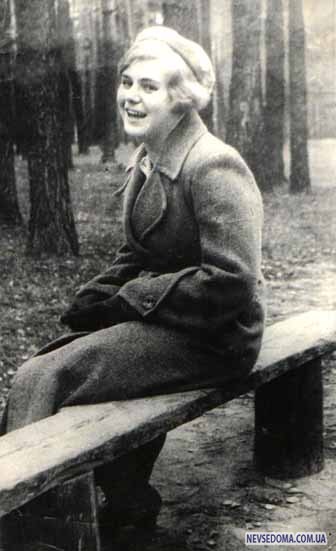
So the story about two people separated by war is completed. Victory Day is just around the corner. And while congratulating the heroes, remember those who remained young forever. About ordinary guys and girls like Yura and Vera. They gave their lives for their Motherland, so that we could live. And our duty, no, our sacred duty, is to convey to future generations the memory of the greatest feat accomplished in the name of the Fatherland. For a people without a past has no future.
p.s. As an epilogue, I would like to cite an excerpt from a letter from the German soldier Wilhelm Elman, which he sent from a village near Moscow to his girlfriend on November 30, 1941: "... Every day brings us great sacrifices. We are losing our brothers, but the end of the war is not in sight and, probably , not to see him. I don’t know what will happen to me tomorrow, I have already lost all hopes of returning home and staying alive. I think that every German soldier will find a grave here. These snow storms and vast fields covered with snow, fills me with mortal horror. It is impossible to defeat the Russians..."

